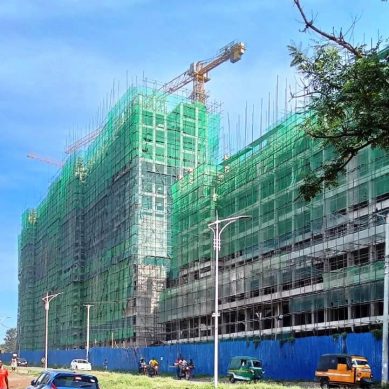
Kenyans have been assured that the new National Building Code 2024 will enhance the standards of construction, ensuring safety, efficiency and sustainability in building practices with a focus on streamlined approval processes.
The code seek to seal loopholes property developers take advantage of build houses that defy safety requirements by use of substandard materials and poor workmanship.
According to Advocate Diana Watila, who represents the National Building Inspectorate, State Department of Public Works, the new National Building Code, 2024 is performance-based and factors in technology, universal access to buildings as well as environment-friendly construction.
Ms Watila says the code’s implementation will transform how construction is carried out in the country by providing for an up-to-date framework and standards for planning, design, approval, implementation, maintenance, and demolition of buildings.
Additionally, she noted, the code ushers in a new era of construction standards that provides for multi-hazard designs, sustainable green construction practices, digital connectivity, liquid petroleum gas connections into buildings and disaster risk management at construction sites.
“This code will minimise the harmful effects on human health resulting from the use of building methods, products, design or building work and provide for universal access standards to all types of buildings,” she elaborated.
The advocate made the remarks during a stakeholder civic education programme held at a Nakuru hotel that sought to popularize the new building code towards ensuring safe, sustainable, and inclusive construction practices.
Published as Legal Notice No.47 on March 1, 2024, the National Building Code 2024 replaces the 57-year-old and outdated Local Government (Adoptive By-Laws) Building Order of 1968. The new Building Code came into effect this month, March 1.
Watila stated that the sensitization program was designed to empower professionals, contractors and the public with the knowledge required to implement the code effectively, focusing on stakeholder engagement and compliance.
The advocate said new code, a set of regulations anchored by the National Construction Authority Act, embodies the government’s commitment to fostering innovation, ensuring safety, and enhancing sustainability in Kenya’s built environment.
The official said by addressing the limitations of the 1968 code, which focused narrowly on conventional materials, the new code incorporates provisions for sustainable materials, modern technologies and disaster resilience.
Key features of the code include mandatory oversight by qualified professionals for all construction processes, advocacy for sustainable building practices, incorporation of fire safety and digital connectivity standards, promotion of universal accessibility, and preservation of cultural heritage.
Additionally, the code seeks to enhance energy efficiency, encourage renewable energy use and support innovation in materials and waste reduction.
Watila observed that by standardizing processes, it ensures clarity and consistency across all phases of construction, from planning to maintenance.
The code empowers regulatory authorities with streamlined systems for approvals, inspections and certifications, bolstering oversight and accountability while addressing risks like structural failures and fire hazards, added the advocate.
“This code is not just a regulatory framework; it is a catalyst for sustainable urban development and economic growth,” the advocate pointed out.
The National Construction Authority (NCA) came up with the code. It was first launched in July 17, 2024. It is the responsibility of NCA to oversee its implementation and ensure compliance.
The code, Watila said, ushers in a new era of construction standards that gives provides for multi-hazard designs, sustainable green construction practices, digital connectivity, liquid petroleum gas (LPG) connections into buildings as well as disaster risk management on construction sites.
Chief Quantity Surveyor, State Department for Public Works, Vincent Kuucha assured that the code will minimise the harmful effects on human health resulting from the use of building methods, products, design and building work.
Kuucha said it will provide for universal access standards to all types of buildings, preserve buildings of significant cultural, historical or heritage value and provide for fire safety by limiting the extent and effects of the spread of fire.
The quantity surveyor said that, by addressing the limitations of the 1968 code, which focused narrowly on conventional materials, the new code advocates for modern technologies and materials.
“Its mandatory five-year review cycle ensures Kenya remains at the forefront of global construction trends, driving job creation and fostering a digitally integrated construction ecosystem,” he added.
He added that the State Department of Public Works has already commenced internal awareness creation by engaging engineers, architects and quantity surveyors who are actively contributing to the code’s implementation committee.
“The code addresses inclusivity by ensuring sanitation facilities for all genders at construction sites and will act as a catalyst for growth, particularly in the manufacturing sector,” said the surveyor.
Kuucha highlighted that the new building code marks a significant improvement from the previous one and reiterated that after independence, Kenya adopted the British system in 1968 under local government, which was highly prescriptive and restrictive in terms of construction materials.
The revised code, however, promotes sustainability and environmental responsibility by allowing innovation, provided materials meet the required standards. It also prioritises safety and climate-conscious construction, ensuring efficient use of available resources such as natural lighting while aligning with modern building practices.
He said before any project commences, it must first receive approval of the county government to verify compliance with legal and procedural requirements in addition to the project undergoing environmental assessment by the National Environment Management Authority (NEMA) to address sustainability concerns.
National Construction Authority will evaluate the qualifications of the professionals involved and inspect building materials to ensure they meet the required quality standards. These measures, he explained, are designed to uphold safety and professionalism in the construction industry.
Senior Investigation officer at NCA, Eng Bernard Were, said that the new code puts into consideration environmental conservation initiatives and that it cures a technicality that was posed by the old code that was inconsistent with the country’s constitution.
Eng Were explained that the code states that the design of a building shall provide adequate structural resistance, serviceability, durability and reliability.
The official explained that the code stated that a building shall be designed to withstand wind, seismic, and accidental loading, withstand flood action for a defined flood event, resist floatation, collapse of significant movement from hydrostatic or hydrodynamic scour, caused by a defined flood event, comply with elevation requirements, comply with material requirements and utilities and enable occupant egress.
The new code, he said addresses the growing need for environmentally friendly buildings, promoting designs that favour water recycling, solar energy and other sustainable features.
“The code sets our own local standards and becomes one of only three building codes in Africa that address issues of sustainability, green building, and climate change,” added Were.
The code, he noted empowers regulatory authorities with streamlined systems for approvals, inspections, and certifications, bolstering oversight and accountability while addressing risks like structural failures and fire hazards.
- A Tell Media / KNA report / by Esther Mwangi and Brian Kiplimo
Advocate Diana Watila from the National Building Inspectorate, State Department of Public Works, sensitizing Nakuru construction stakeholders on the National Construction Code 2024.







